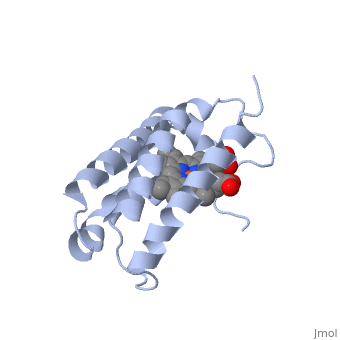We apologize for Proteopedia being slow to respond. For the past two years, a new implementation of Proteopedia has been being built. Soon, it will replace this 18-year old system. All existing content will be moved to the new system at a date that will be announced here.
1a7v
From Proteopedia
(Difference between revisions)
| (12 intermediate revisions not shown.) | |||
| Line 1: | Line 1: | ||
| - | {{Seed}} | ||
| - | [[Image:1a7v.png|left|200px]] | ||
| - | < | + | ==CYTOCHROME C' FROM RHODOPSEUDOMONAS PALUSTRIS== |
| - | + | <StructureSection load='1a7v' size='340' side='right'caption='[[1a7v]], [[Resolution|resolution]] 2.30Å' scene=''> | |
| - | You may | + | == Structural highlights == |
| - | + | <table><tr><td colspan='2'>[[1a7v]] is a 2 chain structure with sequence from [https://en.wikipedia.org/wiki/Rhodopseudomonas_palustris Rhodopseudomonas palustris]. Full crystallographic information is available from [http://oca.weizmann.ac.il/oca-bin/ocashort?id=1A7V OCA]. For a <b>guided tour on the structure components</b> use [https://proteopedia.org/fgij/fg.htm?mol=1A7V FirstGlance]. <br> | |
| - | + | </td></tr><tr id='method'><td class="sblockLbl"><b>[[Empirical_models|Method:]]</b></td><td class="sblockDat" id="methodDat">X-ray diffraction, [[Resolution|Resolution]] 2.3Å</td></tr> | |
| - | -- | + | <tr id='ligand'><td class="sblockLbl"><b>[[Ligand|Ligands:]]</b></td><td class="sblockDat" id="ligandDat"><scene name='pdbligand=HEM:PROTOPORPHYRIN+IX+CONTAINING+FE'>HEM</scene></td></tr> |
| - | + | <tr id='resources'><td class="sblockLbl"><b>Resources:</b></td><td class="sblockDat"><span class='plainlinks'>[https://proteopedia.org/fgij/fg.htm?mol=1a7v FirstGlance], [http://oca.weizmann.ac.il/oca-bin/ocaids?id=1a7v OCA], [https://pdbe.org/1a7v PDBe], [https://www.rcsb.org/pdb/explore.do?structureId=1a7v RCSB], [https://www.ebi.ac.uk/pdbsum/1a7v PDBsum], [https://prosat.h-its.org/prosat/prosatexe?pdbcode=1a7v ProSAT]</span></td></tr> | |
| + | </table> | ||
| + | == Function == | ||
| + | [https://www.uniprot.org/uniprot/CYCP_RHOPA CYCP_RHOPA] Cytochrome c' is the most widely occurring bacterial c-type cytochrome. Cytochromes c' are high-spin proteins and the heme has no sixth ligand. Their exact function is not known. | ||
| + | == Evolutionary Conservation == | ||
| + | [[Image:Consurf_key_small.gif|200px|right]] | ||
| + | Check<jmol> | ||
| + | <jmolCheckbox> | ||
| + | <scriptWhenChecked>; select protein; define ~consurf_to_do selected; consurf_initial_scene = true; script "/wiki/ConSurf/a7/1a7v_consurf.spt"</scriptWhenChecked> | ||
| + | <scriptWhenUnchecked>script /wiki/extensions/Proteopedia/spt/initialview03.spt</scriptWhenUnchecked> | ||
| + | <text>to colour the structure by Evolutionary Conservation</text> | ||
| + | </jmolCheckbox> | ||
| + | </jmol>, as determined by [http://consurfdb.tau.ac.il/ ConSurfDB]. You may read the [[Conservation%2C_Evolutionary|explanation]] of the method and the full data available from [http://bental.tau.ac.il/new_ConSurfDB/main_output.php?pdb_ID=1a7v ConSurf]. | ||
| + | <div style="clear:both"></div> | ||
| + | <div style="background-color:#fffaf0;"> | ||
| + | == Publication Abstract from PubMed == | ||
| + | The crystal structure of an unusual monomeric cytochrome c' from Rhodopseudomonas palustris (RPCP) has been determined at 2.3 A resolution. RPCP has the four-helix (helices A, B, C and D) bundle structure similar to dimeric cytochromes c'. However the amino acid composition of the surface of helices A and B in RPCP is remarkably different from that of the dimeric cytochromes c'. This surface forms the dimer interface in the latter proteins. RPCP has seven charged residues on this surface contrary to the dimeric cytochromes c', which have only two or three charged groups on the corresponding surface. Moreover, hydrophobic residues on this surface of RPCP are two to three times fewer than in dimeric cytochromes c'. As a result of the difference in amino acid composition, the A-B surface of RPCP is rather hydrophilic compared with dimeric cytochromes c'. We thus suggest that RPCP is monomeric in solution because of the hydrophilic nature of the A-B surface. The amino acid composition of the A-B surface is similar to that of Rhodobacter capsulatus cytochrome c' (RCCP), which is an equilibrium admixture of monomer and dimer. The charge distribution of the A-B surface in RCCP, however, is considerably different from that of RPCP. Due to the difference, RCCP can form dimers by both ionic and hydrophobic interactions. These dimers are quite different from those in proteins which form strong dimers such as in Chromatium vinosum, Rhodospirillum rubrum, Rhodospirillum molischianum and Alcaligenes. Cytochrome c' can be classified into two types. Type 1 cytochromes c' have hydrophobic A-B surfaces and they are globular. The A-B surface of type 2 cytochromes c' is hydrophilic and they take a monomeric or flattened dimeric form. | ||
| - | + | Basis for monomer stabilization in Rhodopseudomonas palustris cytochrome c' derived from the crystal structure.,Shibata N, Iba S, Misaki S, Meyer TE, Bartsch RG, Cusanovich MA, Morimoto Y, Higuchi Y, Yasuoka N J Mol Biol. 1998 Dec 4;284(3):751-60. PMID:9826513<ref>PMID:9826513</ref> | |
| + | From MEDLINE®/PubMed®, a database of the U.S. National Library of Medicine.<br> | ||
| + | </div> | ||
| + | <div class="pdbe-citations 1a7v" style="background-color:#fffaf0;"></div> | ||
| - | + | ==See Also== | |
| - | + | *[[Cytochrome C 3D structures|Cytochrome C 3D structures]] | |
| - | + | == References == | |
| - | + | <references/> | |
| - | + | __TOC__ | |
| - | + | </StructureSection> | |
| - | == | + | [[Category: Large Structures]] |
| - | + | ||
| - | + | ||
| - | == | + | |
| - | + | ||
[[Category: Rhodopseudomonas palustris]] | [[Category: Rhodopseudomonas palustris]] | ||
| - | + | [[Category: Bartsch RG]] | |
| - | [[Category: Bartsch | + | [[Category: Cusanovich MA]] |
| - | [[Category: Cusanovich | + | [[Category: Higuchi Y]] |
| - | [[Category: Higuchi | + | [[Category: Iba S]] |
| - | [[Category: Iba | + | [[Category: Meyer TE]] |
| - | [[Category: Meyer | + | [[Category: Misaki S]] |
| - | [[Category: Misaki | + | [[Category: Shibata N]] |
| - | [[Category: Shibata | + | [[Category: Yasuoka N]] |
| - | [[Category: Yasuoka | + | |
| - | + | ||
| - | + | ||
| - | + | ||
Current revision
CYTOCHROME C' FROM RHODOPSEUDOMONAS PALUSTRIS
| |||||||||||


